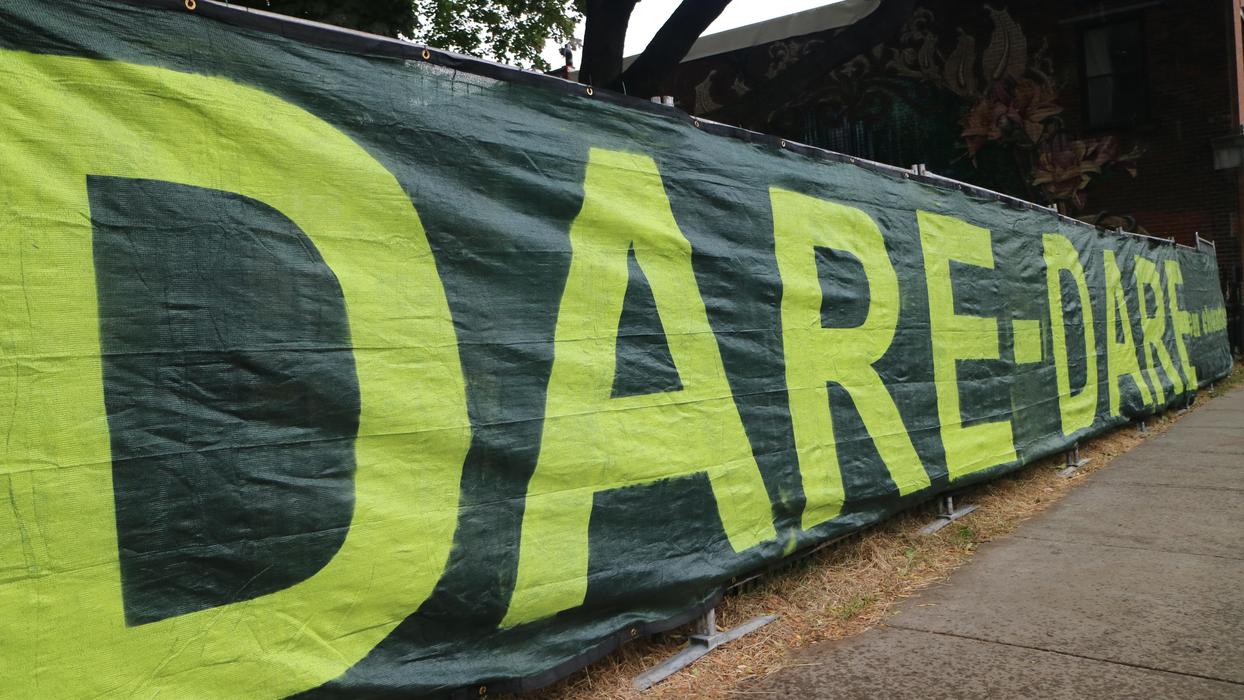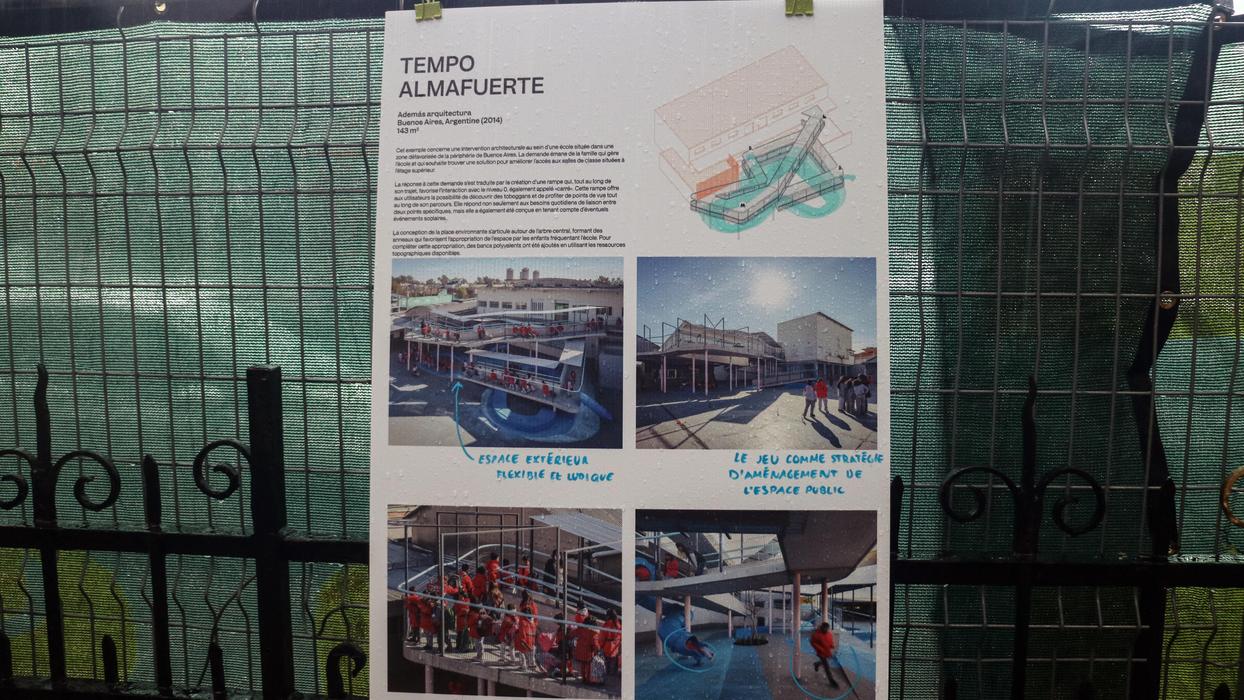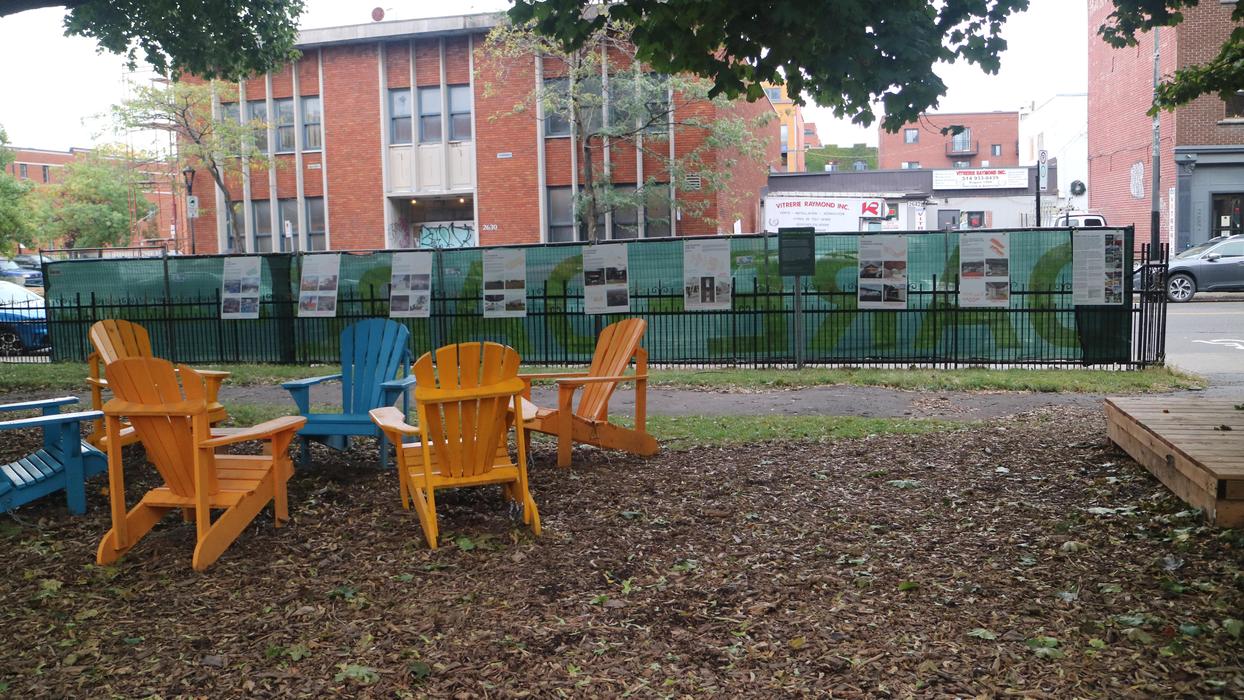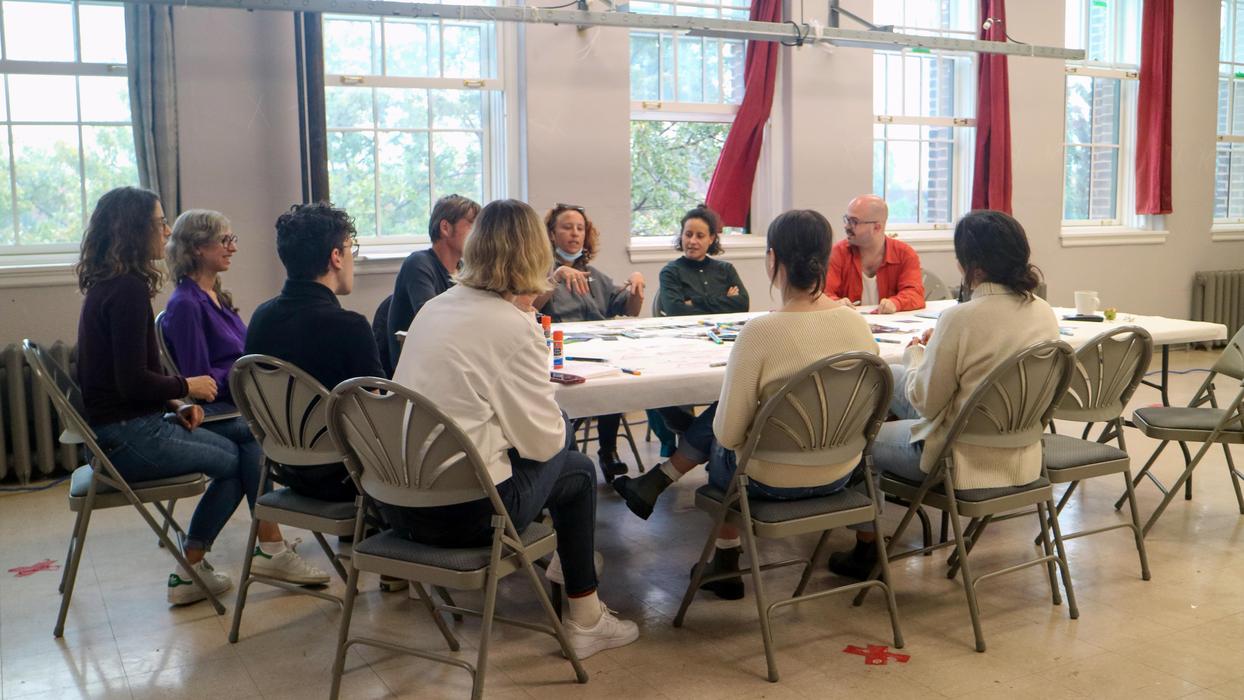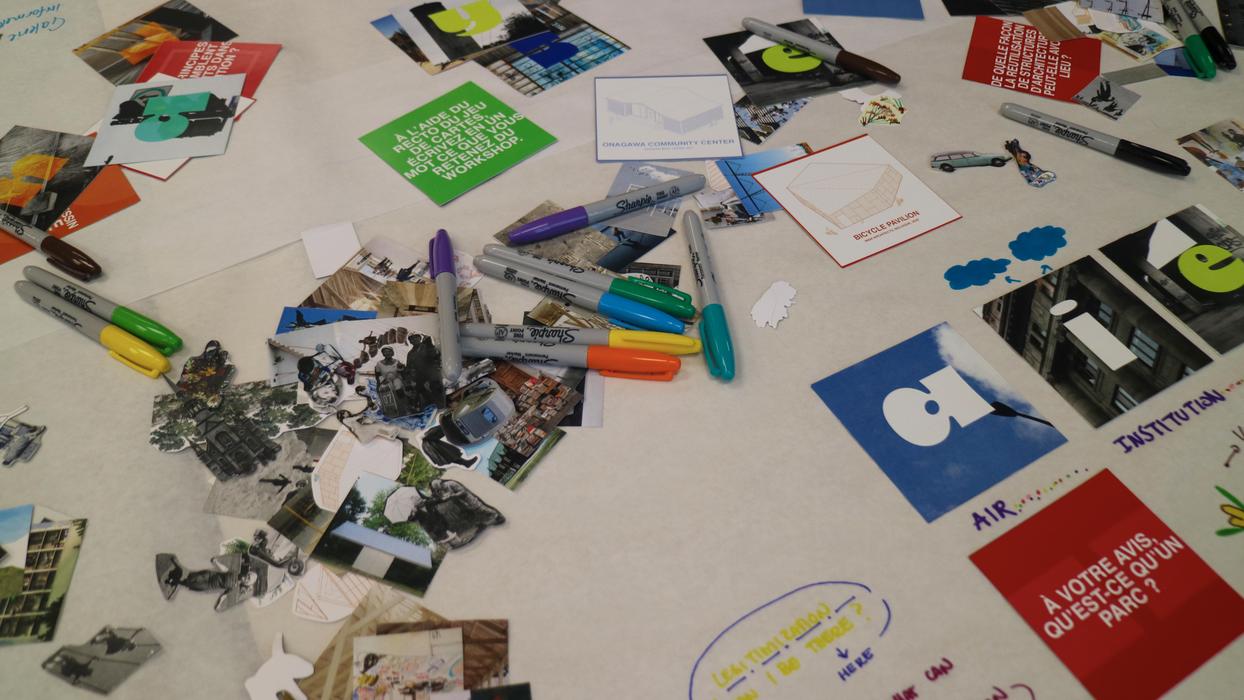Programming
DARE-DARE under construction
projecting dis/location 7
The open-air exhibition presents the results of research carried out in partnership by the École d'architecture de l'Université de Montréal and the artist-run center DARE-DARE.
View more
at Parc Sainte-Cunégonde
Exhibition > October 6 to october 9
Co-conception workshop > October 7, noon to 4:00 pm > open to all
DARE-DARE Under Construction presents to the public the results of research carried out in partnership by the École d'architecture de l'Université de Montréal and the artist-run center DARE-DARE.
The aim of this partnership project is to provide DARE-DARE with inspiration and tools in order to evaluate innovative urban and architectural strategies to develop the next building that will house the artist-run center. This research will help in the decision-making process, as it will take the form of an inventory of architectural projects that identify innovative, economical, modular, adapted, eco-responsible solutions applicable to an artist-run center with a nomadic architectural vocation.
Together, the creation of this open-air exhibition, the participatory conceptualization workshop and the publication that will follow this collective storm of ideas, will guide decisions and support the conceptualization of the architectural program. During the workshop, members of the public are invited to comment directly on the panels and share their ideas, comments and wishes with the researchers - verbally, in drawings or in writing.
Alice Covatta is a professor at the School of Architecture of the Université de Montréal. She is interested in the interdependence between the design of the densified city and the health of its users. Her research has enhanced knowledge of new urban landscapes oriented towards promoting social values, health and the notion of public space. Alice has been a collaborator at the co+labo Laboratory, Keio University, and the Centre for Urban Design and Mental Health since 2016. Her work has been exhibited at the Venice Biennale and the MAXXI Museum in Rome. With associates, she founded the CoPE agency, which won Europan competitions for urban redevelopment in New Ulm and Wernigerode, Germany.
The building is intended to become a place of anchorage and integration for artistic communities and for the neighborhood's residents; it will support social cohesion by contributing to the emergence of collective citizen uses, innovative artistic practices, unifying events and bold works.
For this next DIS/LOCATION, which will be the seventh of the cycle, the artist-run center advocates a ten-year installation, allowing it to develop, nurture and maintain meaningful links with its host neighborhood. After that, this semi-nomadic architecture can reposition itself in a new city context to pursue its mission.
The DARE-DARE DIS/LOCATION 2023 committee is composed of :
Raquel Cruz Crespo, Martin Dufrasne, Anne-Marie Ouellet, Josianne Poirier, Jean-François Prost, Anouk Verviers
The project was carried out by :
Alice Covatta, research project manager and professor at the School of Architecture, Université de Montréal
Laetitia Bégin-Houde, student, School of Architecture, Université de Montréal
Jean-Simon Bissonnette, student, School of Architecture, Université de Montréal
Maude Carpentier, student, School of Architecture, Université de Montréal
Alice Covatta is a professor at the School of Architecture of the Université de Montréal. She is interested in the interdependence between the design of the densified city and the health of its users. Her research has enhanced knowledge of new urban landscapes oriented towards promoting social values, health and the notion of public space. Alice has been a collaborator at the co+labo Laboratory, Keio University, and the Centre for Urban Design and Mental Health since 2016. Her work has been exhibited at the Venice Biennale and the MAXXI Museum in Rome. With associates, she founded the CoPE agency, which won Europan competitions for urban redevelopment in New Ulm and Wernigerode, Germany.
Jean-Simon Bissonnette is currently pursuing his first year of a master's degree in architecture at the Université de Montréal. His academic career was marked by a semester of study in Venice in the summer of 2022, where he immersed himself deeply in the study of Italian cities and their public spaces, broadening his perspective on urban design. Jean-Simon is particularly interested in sustainable city design, urban revitalization and the promotion of sustainable mobility. He aspires to play a significant role in the creation of inclusive, functional and environmentally-friendly cities, capable of responding to the societal and climatic challenges of our time.
In the spring of 2021, Samuelle Bolduc graduated from the Université de Montréal with an undergraduate degree in International Studies. During her studies, she took a particular interest in environmental policy, environmental law, and sustainable development issues. Pleased with the background she acquired, Samuelle also realized that global change takes time, lots of time. That's why she decided to pursue her studies in architecture at the Université de Montréal, a discipline in which she believes she can have a positive impact, on a smaller scale. She is currently completing her third year of her bachelor's degree, which was marked by a summer workshop in Brazil, where she was able to free herself from the constraints of the Quebec climate, enabling her to evolve her conception of the relationship between the environment and the built environment, between the interior and the exterior. Her interests and sensibilities follow her into her new field, where she is particularly interested in the cities of tomorrow, flexible architecture, and deconstruction.
Maude Carpentier is a graduate of the Université de Montréal's Master of Architecture program, and is currently completing her thesis project as part of the Ville Refuge workshop is currently completing her thesis project as part of the Ville Refuge workshop, led by Irena Latek, Alain Carle, Alice Covatta, Fannie Duguay-Lefebvre and Clotilde Simon. The workshop focuses on human migration, a topical phenomenon that is not likely to disappear anytime soon with the environmental crisis forcing more and more people to move. She questions the values of welcome, hospitality and solidarity that can be conveyed by a city architecture itself. An eternal optimist, she has discovered an interest in architecture with a social vocation, human being at its heart, and firmly believes in the transformative power of architecture and its impact on the way we live together. Through literature, art, history, sociology as well as mathematics and physics, she enjoys enjoy exploring the many facets of this discipline, gradually developing a sensitivity and gradually developing a sensitivity to the various issues that are closely or remotely related to it.
Laetitia Bégin-Houde, a graduate of the Université de Montréal's Master of Architecture program and of the Technology of Architecture program, is interested in the intangible aspects of architecture, which lie beyond the built environment it implies. She sees architecture as a means of addressing social, environmental and urban issues, convinced that it can act as an imperceptible transformer of our environments. She is therefore mainly interested in the relationship between architecture and what it isn't, what leads to it or what emerges from it, the way it conditions our lifestyles, affects those it shelters and contributes to influencing our interactions with our environments. Laetitia is currently completing her master's degree in the Ville refuge workshop, which focuses on the role of architecture in the current migratory context. This workshop looks at how to think about the hospitality of cities through a logic of solidarity, and questions the role that architecture (and the architect) can play in this.
Acknowledgements
The Social Sciences and Humanities Research Council, the federal granting agency that promotes and supports research and research training in the humanities and social sciences.
